 Nations: Mania: Language
Nations: Mania: Language Nations: Mania: Language
Nations: Mania: Language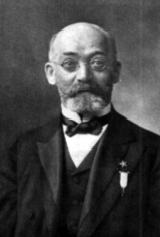 Ludwig ZamenhofLearn a new language, gain a new soul.
Ludwig ZamenhofLearn a new language, gain a new soul.
Polish saying
If a language can contain the spirit and wisdom of a culture, then Esperanto is an expression of internationalism, humanism and reason. It was a natural choice as the language of Mania, and my only problem now is learning to speak it properly. Until I do, the official language of Mania is Esperantacxo, or 'terrible Esperanto'.
That I should have made any progress at all is a tribute Esperanto's simple elegance. I have no skill for languages, and must be one of the very few people in the world who have managed to forget their mother tongue (see here), a linguistic achievement akin to a mountaineer falling down a hole on his way to the climb. Despite elementary qualifications in French and Latin, in France I am openly laughed at (though, curiously, this is before I have said anything in French), and in ancient Rome, as I wait for the hallucinagens to clear, I am reduced to pointing at menus.
 The Esperantist Flag
The Esperantist Flag
Five points on the star for five continentsWhen Ludovic Lazarus Zamenhof published the Unua Libro or 'first book' describing his international language in 1887, he signed himself Esperanto or 'he who hopes'. His hope was to allow people of different nationalities to overcome one of the artifial borders separating them, different languages, by creating a universal second language. Rather than suggesting an existing language to play this role, he devised a new one, which now bears the name under which he wrote: Esperanto. Only in this way could it be made neutral, and easy to learn.
Noone, even amongst the language's detractors, seems to dispute that Esperanto is easier to learn than any natural language. It's perfectly regular grammar is easy to master, and its vocabulary is kept small by using a simple system of prefixes and suffixes to create words with related meanings. Thus bona (good), yields bone (well), malbona (bad), malbone (badly), boneco (goodness), and even bonulo (nice guy).
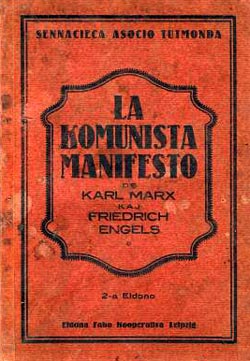 The Communist Manifesto in EsperantoThe international neutrality of Esperanto was equally important to Zamenhof. Most languages have become, literally and metaphorically, ways of expressing of nationalism. The modern ubiquity of English is not based (as some of its speakers seem to imagine) on any inherent merit, but on a bloody history of British empire building. Unsurprisingly, the growing use of English in non-English speaking countries is a hated sign of 'cultural imperialism', nationalist opposition to which frequently involves a defiant promotion of the local language. On both sides, it is easier to reinforce nationalism, and undermine human solidarity, between people speaking 'alien' and unfamiliar languages.
The Communist Manifesto in EsperantoThe international neutrality of Esperanto was equally important to Zamenhof. Most languages have become, literally and metaphorically, ways of expressing of nationalism. The modern ubiquity of English is not based (as some of its speakers seem to imagine) on any inherent merit, but on a bloody history of British empire building. Unsurprisingly, the growing use of English in non-English speaking countries is a hated sign of 'cultural imperialism', nationalist opposition to which frequently involves a defiant promotion of the local language. On both sides, it is easier to reinforce nationalism, and undermine human solidarity, between people speaking 'alien' and unfamiliar languages.
The fundamentally subversive nature of Esperanto is clear from its impressive history of oppression and prohibition. The Tsarist government in Russia banned Esperanto between 1895 and 1905, a tradition picked up by the Stalinists who registered Esperantists in 1930 before sending them to Siberia, or simply shooting them, from 1938. France banned the teaching of Esperanto in schools in the 1920s. Hitler called Esperanto a Jewish tool of world domination in Mein Kampf, and banned Esperantist organisations. The second world war Japanese government persecuted Esperantists, whom it described as watermelons...
...green, the colour of the Esperantist flag, on the outside, and red, or communist, on the inside.
 "LEARN ESPERANTO! SPEAK TO THE WORLD!"Learn Esperanto. It is easy, fun, and can be learnt in a quarter of the time it would take to learn any other language. Better yet, there is even evidence that Esperanto's simplicity and clarity increase your confidence, and give you a better understanding of language in general, making other languages easier to learn.
"LEARN ESPERANTO! SPEAK TO THE WORLD!"Learn Esperanto. It is easy, fun, and can be learnt in a quarter of the time it would take to learn any other language. Better yet, there is even evidence that Esperanto's simplicity and clarity increase your confidence, and give you a better understanding of language in general, making other languages easier to learn.
As ever, the wikipedia provides an excellent description of Esperanto, at en.wikipedia.org/ wiki/ esperanto.
An amazing free email correspondence course can be signed up to at pacujo.net/ esperanto/ course/.
Alternatively, for an excellent automated web-based course in Esperanto, try www.lernu.net.
And... and the truth is there is a huge range of websites teaching the language, using the language to offer entertainment and news, disucssing the language's history and purpose, and putting Esperanto speakers in contact with each other online and offline. Just type Esperanto into www.google.com!
For the time being, though, take your first steps in Esperanto via the popular Manic young people's classic, Revolucio por Infanoj, or 'Revolution for Children'...
 Cxitiu estas Homo. Saluton Homo!
Cxitiu estas Homo. Saluton Homo!
This is Human. Hello Human!
Homo estas libera.
Human is free.
 Homo povas fari cxion...
Homo povas fari cxion...
Human can do anything...
...kion sinjoro Sxtato permesas.
...that Mr State allows.
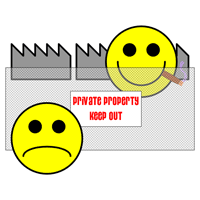 Homo povas iri ien...
Homo povas iri ien...
Human can go anywhere...
...kien sinjoro Kapitalismo ne propras.
...that Mr Capitalism doesn't own.
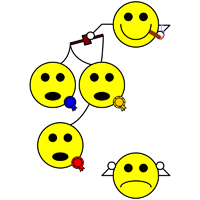 Homo povas baloti por iu...
Homo povas baloti por iu...
Human can vote for anyone...
...kiun estas amiko de sinjoro Kapitalismo.
...who is a friend of Mr Capitalism's.
 Homo kredas estus PLI libera.
Homo kredas estus PLI libera.
Human thinks he could be MORE free.
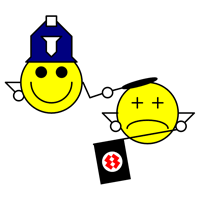 Sinjoro Sxtato ne akordas.
Sinjoro Sxtato ne akordas.
Mr State doesn't agree.
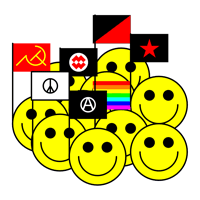 Homo unuigas kun amikoj...
Homo unuigas kun amikoj...
Human joins with some friends...
...kiuj deziras estas pli libera ankaux.
...who want to be more free too.
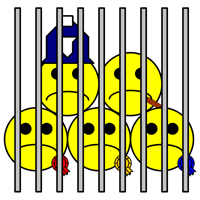 Ili revolucias!
Ili revolucias!
They revolt!
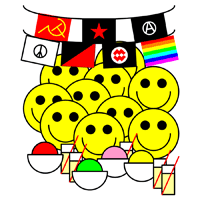 Poste, ili festas...
Poste, ili festas...
Afterwards, they have a party...
...kun glaciajxo kaj limonado!
...with ice-cream and lemonade!